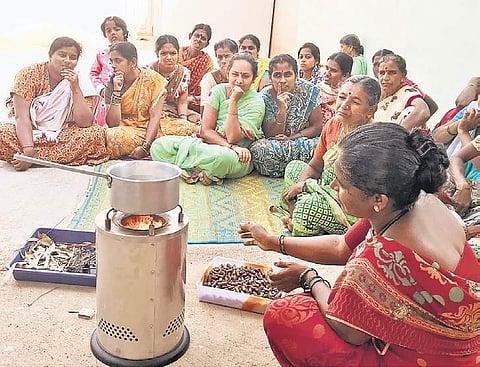

BENGALURU: While several households have been struggling due to not receiving LPG subsidies, the number of rural women in the city who have been taking to ‘chulhas’ or brick stoves, has also increased. The need for firewood has gone up, with women walking 3-4 km to the forest to collect 120kg for one house, which may last for one week. Seeing the suffering of these women, BlueMatch Clean Cooking Solutions decided to provide them with eco-stoves.
“Every month, it costs us `1,050 for a cylinder. So we started to depend on firewood, but for that, we needed to get permission from forest officials, who usually don’t let us in. So we usually enter when they are off-duty. With the chulah, the smoke was a problem for us and vessels would get worn out. Also during rains, it is difficult to use firewood,” says Sharadhamma, a villager and the president of Chetana Women and Community Development Multipurpose Souharda Cooperative Society.
“We return with back and neck pain, and at times from carrying firewood on our heads. It is also not safe for us to walk in the forest alone due to animals lurking,” says Bhagyamma, member of the women’s federation. In addition, hiring a canter to bring the firewood costs `5,000 each time.
Rolf Boerkel saw these women were cooking for 8 to 12 people. “That process needed to be speedened,” says Boerkel, founder of BlueMatch Clean Cooking Solutions. Currently, there are five women arranging around 500 stoves for these rural women. Earlier in October, two women from the village near Hoskote were sent to New Delhi to provide a demo of the product at the National Handicraft Museum to 25 Dutch students. “It would take us more than 15 minutes to cook rice, but with this stove, it takes just six minutes,” says S Prema, another villager.
“The stove that burns on (local) biomass called pellets, is made out of coffee husk. This results in clean and non-smoking cooking. The fan is used to regulate the temperature and all the heat is focussed towards the centre, adding more heat to the fire,” says William Peters, partner of the company.
He added that it costs `400 for a bag of pellets, which can last a month. “The government can provide subsidies for these pellets and cooking eco-friendly for these rural women. It reduces carbon dioxide emissions to a great extent,” he says. “Now, 95 per cent of the families in my village are using this stove. And there is no need for firewood anymore,” says Bhagyamma, pointing out that fewer trees are being cut, reducing deforestation.